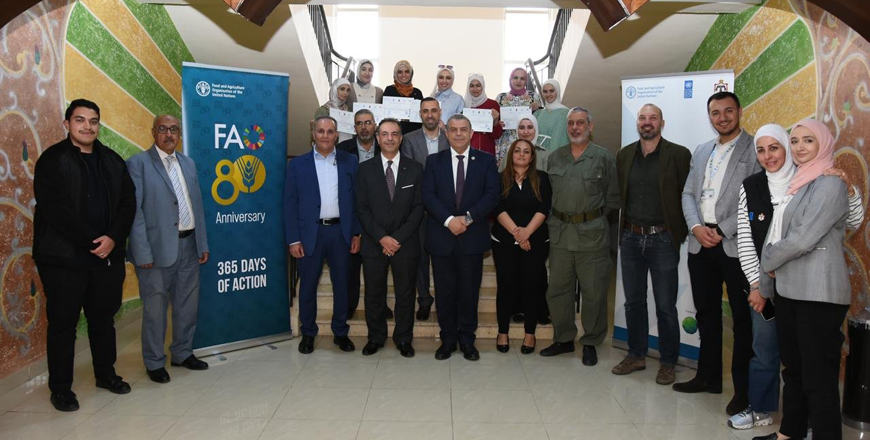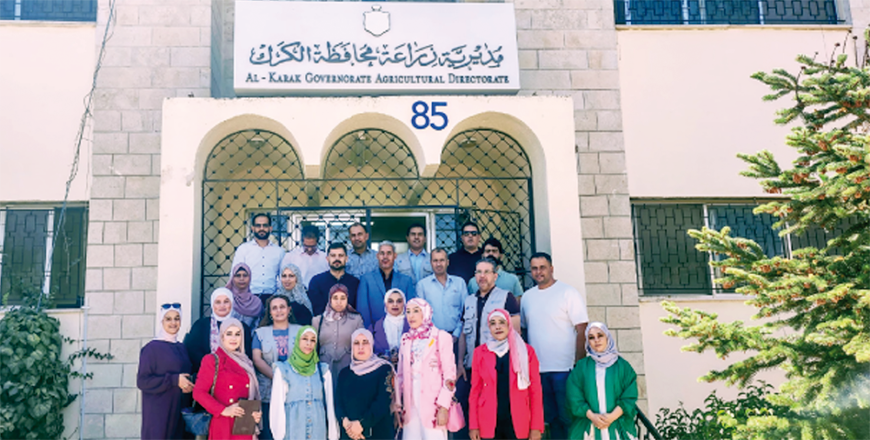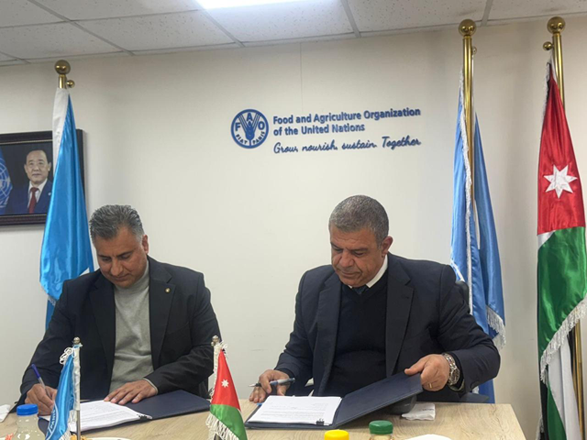You are here
FAO, Mu’tah University launch women-led climate adaptation initiative
By JT - Apr 16,2025 - Last updated at Apr 16,2025

The Food and Agriculture Organisation of the United Nations (FAO) in Jordan, in cooperation with Mu’tah University, on Wednesday celebrates the graduation of a group of ‘Climate Wise Women Agents’ (CWWAs) (Photo courtesy of FAO)
AMMAN — The Food and Agriculture Organisation of the United Nations (FAO) in Jordan, in cooperation with Mu’tah University, on Wednesday celebrated the graduation of a group of “Climate Wise Women Agents” (CWWAs), who completed a six-month training programme on climate change adaptation.
The training is part of an agreement between FAO and Mu’tah University under the $33.25 million project, “Building Resilience to Cope with Climate Change in Jordan through Improving Water Use Efficiency in the Agriculture Sector” (BRCCJ).
The project is funded by the Green Climate Fund (GCF) and implemented by FAO in cooperation with the ministries of Water and Irrigation, Agriculture, Environment, and the UN Development Programme (UNDP), according to a FAO statement.
The eight graduates, female agricultural engineers, are now certified trainers who will go on to empower 400 women across the governorates of Karak, Madaba, Tafileh, and Ma’an, enabling them to better adapt to the impacts of climate change, support their families, and promote sustainable development in their communities.
Speaking at the ceremony, FAO Representative in Jordan Nabil Assaf said: “FAO is investing in women as drivers of change. One of our most important initiatives is the BRCCJ project, which includes establishing a cadre of 400 Climate Wise Women to promote climate resilience in vulnerable areas.”
He added that the eight newly certified agents are a major output of the FAO-Mu’tah agreement, which included developing a training manual and providing technical training to prepare the graduates for their role in scaling climate-smart practices.
Representing the university, Vice President for Scientific Colleges Affairs Ameen Aqel affirmed the university's commitment to community development. “The trained women will act as a core group to raise awareness and train 400 women,100 in each of the four targeted governorates, on climate adaptation strategies, particularly in agriculture and water resource management,” he said.
He also said, "The challenges posed by climate change require a strong national response, including the adoption of sustainable environmental policies, improving water resource management, and raising public awareness about the importance of climate adaptation."
He pointed out that climate change has significant negative effects on the Kingdom due to its geographical location and the environmental conditions it faces, particularly water scarcity.
Director of the Prince Faisal Centre for Dead Sea, Energy, and Environmental Research Amjad Tarawneh also attended the ceremony.
The BRCCJ Project, with a fund at $33.25 million, targets four governorates in the Dead Sea Basin—Karak, Madaba, Tafileh, and Ma’an, which are particularly vulnerable to climate change and water scarcity resulting from shifting climate conditions.
The residents of these areas mainly rely on rain-fed agriculture, face high poverty rates, and lack adequate knowledge and resources to cope with climate change, the statement said.
Women, as key agents of change in climate adaptation, are playing a central role in this project, aiming to improve women's accessibility to resources and information which will enable them to become more adaptive to climate change and safeguard their livelihoods.
Related Articles
AMMAN — The Food and Agriculture Organisation of the United Nations (FAO) in Jordan and Mutah University on Sunday signed an agreement where
KARAK — The Food and Agriculture Organisation of the United Nations in Jordan (FAO), in cooperation with the Ministry of Agriculture, launch
AMMAN — The Food and Agriculture Organization of the United Nations (FAO) in Jordan and Alhalat Developing co.














